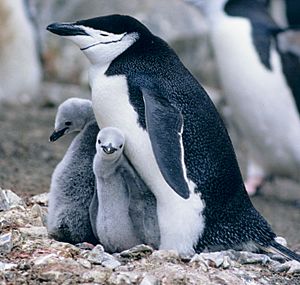Roy and Silo facts for kids

Roy and Silo were chinstrap penguins, similar to those pictured.
|
|
| Species | Chinstrap penguin |
|---|---|
| Sex | Both male |
| Hatched | 1987 |
| Known for | Same sex animal couple |
| Offspring | Tango |
Roy and Silo were two male chinstrap penguins born in 1987. They lived at the Central Park Zoo in New York City. In 1998, zoo staff noticed them acting like a penguin couple. They even tried to hatch a rock as if it were an egg.
This gave the zookeepers an idea. They gave Roy and Silo a real egg from another penguin pair that couldn't hatch it. Roy and Silo successfully raised the chick, a female named Tango. Tango later formed a pair with another female penguin. Roy and Silo eventually separated. In 2005, Silo found a new partner, a female penguin named Scrappy. The story of Roy and Silo has been shared in a children's book and a play. Other zoos around the world have also allowed male penguin pairs to adopt eggs. Both Tango and Roy have since passed away.
The Story of Roy and Silo
Roy and Silo met at the zoo and became a couple in 1998. They performed special actions that penguins do when they are pairing up. This included wrapping their necks together and making mating calls. In 1999, they were seen trying to hatch a rock. They also tried to take eggs from other penguin couples.
When the zoo staff realized both Roy and Silo were male, they tested them. They replaced the rock with a fake egg made of stone and plaster. Roy and Silo took good care of this fake egg. This made the zookeepers decide to give them a real egg. It came from a penguin couple that had trouble raising two eggs at once.
Roy and Silo kept the egg warm for 34 days. They then spent two and a half months raising the healthy chick. This chick was a female named Tango. When Tango grew up, she paired with another female penguin named Tanuzi. By 2005, they had been a couple for two breeding seasons.
After their story became famous, Roy and Silo separated. A more aggressive pair of penguins pushed them out of their nest. In 2005, Silo found a new partner, a female penguin named Scrappy. Scrappy had come from SeaWorld Orlando in 2002. Both Tango and Roy have since died.
Roy and Silo's Impact
Roy and Silo were not the first male penguin couple known in New York. A pair named Wendell and Cass at the New York Aquarium were reported in 2002. However, Roy and Silo gained more attention. The New York Times published a story about them in May 2004. The article called them "gay penguins" and mentioned other similar pairs in New York.
Roy and Silo's story inspired two children's books. One was And Tango Makes Three by Justin Richardson and Peter Parnell. It was illustrated by Henry Cole. The other was a German book called Zwei Papas für Tango (Two Daddies for Tango). And Tango Makes Three became very popular. It was also listed as one of the most talked-about books in libraries and schools for five years.
Roy and Silo have also been characters in plays. One play was Birds of a Feather. It was about different kinds of relationships. It first showed in Fairfax, Virginia in July 2011. Another play, And Then Came Tango, was for young audiences. It was first performed in March 2011 at The University of Texas at Austin.
Some groups reacted to Roy and Silo's separation. A spokesperson for the National Gay and Lesbian Task Force said that the actions of two penguins do not answer questions about how sexual orientation develops. A study in 2010 found that male penguin pairings are common. However, these pairings usually do not last more than a few years.
The public attention led to discussions when stories came out about zookeepers separating same-sex penguin couples. This was sometimes done because the number of some penguin species was decreasing. However, allowing same-sex penguin pairs to adopt eggs or chicks, like Roy and Silo did, has been repeated.
- In 2009, German zookeepers gave an egg to a male pair of Humboldt penguins, Z and Vielpunkt. They hatched the egg and raised the chick.
- In 2011, Chinese zookeepers gave a chick to a male penguin pair. This happened when the chick's natural parents could not care for two chicks.
- In 2018, Sealife Sydney in Australia saw two male Gentoo penguins successfully hatch an egg. They had been seen with a fake egg before. In 2020, they hatched a second egg. Their first chick also had her own chick.
- The Central Park Zoo has had other same-sex couples. This includes a male couple (Squawk and Milo) and a female couple (Georgey and Mickey). They both showed courtship behavior.
- In 2014, zookeepers at Wingham Wildlife Park in Kent, UK, gave an abandoned egg to a male Humboldt penguin pair, Jumbs and Kermit. The park owner said they were "two of the best penguin parents we have had yet."
See also
- List of individual birds
- Sphen and Magic
- Penguin behavior
- List of animals displaying homosexual behavior
 | Valerie Thomas |
 | Frederick McKinley Jones |
 | George Edward Alcorn Jr. |
 | Thomas Mensah |

